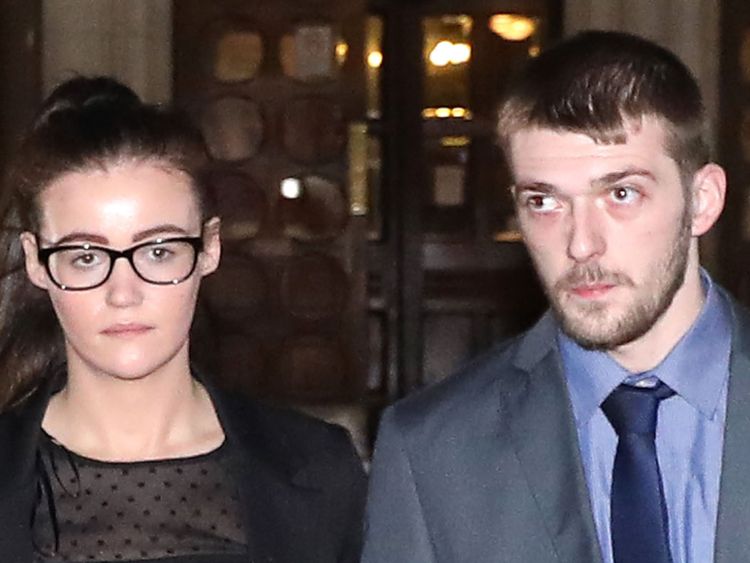The end of Alfie Evans’ brief life just short of his second birthday is a tragedy for his parents, who devoted themselves to his care.
He spent 17 months on the intensive care unit at Alder Hey Children’s Hospital.
His death however, has been a subject of fierce public debate in the UK, the United States and beyond.
At its heart are questions about the rights of the child, the limits of parental responsibility, and how best to untangle the knot of ethical and medical issues.
In most cases, the fate of a terminally ill child is resolved without publicity or debate. Doctors and parents reach agreement away from the courts and the cameras, and where there is legal challenge it is settled under the anonymity of the family courts.
:: Timeline: How parents fought to save Alfie
Three times in the last nine months, however, these battles have been played out in public, as the parents of Charlie Gard, Isaiah Haastrup and now Alfie went public as they fought in court to keep their children alive.
All three cases were different in detail, but at their heart are the same questions about who, ultimately, decides how a child lives and dies when medicine can do no more.
These are desperately difficult issues for families and doctors to navigate – but British law is quite clear.
The Children’s Act 1989 states that “the child’s welfare shall be the court’s paramount consideration”, and legal precedent has consistently followed that line.
The rights of the child are treated as separate from those of the parents, usually represented in proceedings by a court-appointed guardian, and the “best interests” of the child are put first.
Who defines “best interests” is central, and the courts have consistently followed medical opinion, rather than moral or religious arguments.
In Alfie’s case, there was no dispute about his condition. Doctors from three countries agreed he was in a semi-vegetative state and that there was no chance of recovery.
Since December 2016, the toddler had suffered from an undiagnosed degenerative brain disease which ultimately left him with almost no discernible brain function and reliant on life support.
In the final court hearing before his death, the barrister for his father, Tom Evans, told the court they were seeking “care, not cure”.
In contrast to the case of Charlie Gard, which saw doctors in the US offering further treatment, Alfie’s case became a decision about how and where he died.
The choice was between two palliative care regimes: Alder Hey Hospital, one of the most advanced and experienced paediatric centres in Europe, or the Bambino Gesu hospital in Vatican City.
Mr Evans is Catholic, and the Pope, who had received him at the Vatican, had provided a military air ambulance on standby to take his son to Rome.
The court was told that there, the palliative regime would be in line with Catholic teaching, provided with “a view to continuing life” rather than managing Alfie’s death.
Ultimately, it was a choice between the will of the parents and the advice of doctors – and the courts found with the latter.
It was consistent with precedent but there are those who believe a more nuanced position was possible.
Raanan Gillon, emeritus professor of medical ethics at Imperial College, told Sky News: “Where possible, the courts should allow people to follow their side of the moral dilemma.
“It was possible to say it is okay for the doctors to withdraw treatment but also legally permissible for family to find doctors that agree with the parents and care for him elsewhere.”
As with Charlie Gard, Alfie Evans’ plight was seized upon by religious campaigning groups and their interventions have sometimes looked like exploitation.
For the last month, the Christian Legal Centre provided pro bono legal support to the Evans family.
It is part of Christian Concern, a group that seeks to “see the United Kingdom returned to the Christian faith” in order to reverse “family breakdown, immorality and social disintegration”.
They deny exploiting the family, but one of their case workers did advise Mr Evans to seek a private prosecution against doctors at Alder Hey for conspiracy to murder.
There have been other nakedly political interventions. Senior figures on the Republican religious right in the US have warned that the case exemplifies the dangers of “socialised medicine”, ignoring the fact that NHS free-at-the-point-of-use treatment kept Alfie alive for 17 months.
Nigel Farage told Fox News Alfie’s fate had effectively been decided by a “death panel” convened by the state, ignoring the division between the executive and the courts.
Far more distressing than the attention-seeking of politicians has been the abuse of staff at Alder Hey Hospital, and demonstrations that at one stage saw a police line strung across the doors to keep protesters out.
The hospital is hugely valued by the people of Merseyside, utterly embedded and overwhelmingly supported by the community it serves. Repairing that relationship will take time.
And we should get used to these disputes. As medicine advances, more children will be kept alive but not cured.
Familiarity with the issues will not make them easier to resolve.
From – SkyNews


